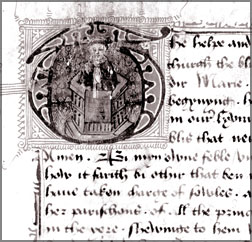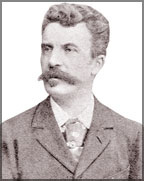
Early English Prose
By Carl Muller
Unlike poetry, English prose was hardly written between 1400 and
1500. However, legal and Parliamentary business began to be translated
into English. Latin and French were not used.
But there was a Norfolk family, the Pastons, that for three
generations preserved their letters and business documents, all in
English, and these gave a good picture of the times. It was a near state
of anarchy then, and Agnes Pastor has told of how one of her sons had
begun to study law.
She had written to the boy’s tutor, telling him that if her son
failed in his lessons, he must “trewely be lassched tyl he amend” (truly
be lashed until he amends) and reminded that when her son was at
Cambridge, “the mayster did so.” (the master did so).

Daughters were considered an encumbrance. Agnes Paston did not allow
her daughter to speak to anyone, and also beat her at least twice a day.
Books were expensive, and even a cheap Bible cost nearly three pounds
in those days, but things got better when the first printing press was
set up in Mainz, Germany.
The art of printing was carried to Italy in 1465, to France in 1470,
to Holland in 1471, to Belgium and Austria in 1473, to Spain in 1474 and
finally to England in 1476, brought in by William Caxton. Caxton had
previously set up a press in Bruges, and in 1475, brought out the first
book printed in English.
“Recuyell of the Histories of Troy.” This was followed by “Game and
Playe of Chesse.” In England, Chaucer’s first works were the “Canterbury
Tales” and “History of Jason” and before he died in 1491, he had put out
over fifty books, many being translations he made himself. Caxton
admired Chaucer so much that he placed a tablet in his memory in
Westminster Abbey.
He also did his best to unify the English language. As he said.
“Certaynly, our language now used varyeth ferre from whiche was used and
spoken when I was borne.”The problem was in the many dialects used in
different parts of England. If a man asked a woman for “eggs” she would
accuse him of speaking French.
She insisted that the English word was “eyren”, Caxton remarked:
“Between playn, rude and curious, I stand abashed, but in my judgemente,
the comyn that be dayli used ben lighter to be undestonde than the olde
and auncyent englysshe.” (the common language used daily was easier to
understand than the old ancient English.) It was printing that gave the
impetus for writing prose.
The reading public also took to prose rather than poetry. Caxton made
a compilation of stories titled “Golden Legends” and also printed
stories of king Arthur under the title “Morte’d Arthur”. That was the
most important book of the 15th century.
The author of the stories. Sir Thomas Mallory, translated the
Arthurian legends so beautifully that not even Tennyson, who later wrote
“Idylls of the King” could do better. We will look at one of these
legends next, concerning “The Sword Excalibur.”

The woman and the tiger

“Good Morning”
All the children stood up.
I looked around the class.
Victor was absent
“Do you know why Victor is absent?”
“No.”
“Do you know where he stays?”
Kamal answered.
“No, Miss. We don’t know. Victor doesn’t like us visiting his house.”
This incident happened about thirty years ago. Victor came to our
school only at the beginning of that year. There were two G.C.E. (O/L)
classes and I was in charge of one of them. Victor was put into my
class. I greeted him to my class and asked his name, where he stays etc.
Victor was fair, thin and tall with dark, curly hair. He was not an
ugly boy. But he had a morose look. He never smiled. He was always
alone. Even during the interval, he would be at his desk doing some
work. I tried to talk to him when he was alone, but he never responded.
Sometimes during the interval, the children enjoyed themselves
singing but Victor never joined them. It was as if he had built a hard
shell around him, which no one could break. I knew that he was a loner
and wanted to help him. Victor did his school work satisfactorily.
In fact, he was better than most of the students of that class.
Victor was good in sports too and was selected to take part in the
circuit meets.
We had an “English Day” in our school. Although Victor did not want
to take part in any item, I persuaded him to do so. Reluctantly he
joined, as if he could not say “no” to my request.
Many parents came for the “English Day” celebrations. But none from
Victor’s came. When there were special events like the sports meet and
the English day, the children and the teachers work together, work
closely, and become very friendly. Although Victor took part in all
these, we could never drag him out of his shell.
Victor went with us in the school excursion, but never joined the
others in singing. He sat in a corner of the bus looking out of the
window.
Although Victor was not friendly with his classmates, he never had
any brawls with them. Victor’s classmates too realised that he does not
like to move with them. So they spoke to Victor only when necessary.
I advised my students to keep their books clean and tidy and that I
would check their books whenever I got the chance. One day, when I
checked the books, there was a picture of a tiger and a woman drawn in
many of Victor’s books. It was drawn either with a pencil or with a
carbon pen.
The woman wore a cloth and a jacket and the tiger was always facing
the woman as if to pounce on her. The same picture was drawn in several
angles. Sometimes a revolver was pointed at the tiger. I could not grasp
what this picture meant. But I felt that it had something to do with his
strange behaviour.
I knew that Victor was bottling up his feelings. I was afraid that if
this situation is not remedied this boy might become a menace to the
society or might even end up in jail. I felt that I could not help him.
Since he was in my class, I felt that he was my responsibility.
Therefore, I decided to tell. Mr. Perera, another teacher about Victor.
He had already noticed Victor’s strange behaviour and was ready to help
me. Unfortunately, even he could do nothing.
It was the time to send in the applications for the examination. The
principal advised me that the names of the applicants must be filled
according to the names given in their birth certificates.
So I had to check the birth certificates of all the students sitting
for the examination that year. When I checked, only Victor’s birth
certificate was missing. The clerk had put a note in the admission
register that the birth certificate was not handed over to the school.
Suddenly I remembered an incident that happened at the circuit sports
meet. The officials at the circuit meet checked the date of birth of all
the participants before each event. I saw Victor showing the certificate
to the officials and then putting it back in his pocket. Therefore, I
knew that Victor had his birth certificate with him. So I decided to ask
Victor for his birth certificate.
“Victor, we need your birth certificate to fill the application form
for the exam. It is not in the office. Can you bring it?” I told him
after school.
“Yes, Miss,” he replied softly, not looking at me.
Victor was absent next day. He had never been absent earlier. It was
when he did not come the following week too, that I asked my students
whether they knew why Victor was absent. I was worried. Finally, I told
the principal. The principal knew Victor’s uncle who was his guardian.
He promised to visit Victor’s uncle that afternoon itself.“Victor’s
mother is a servant. She had Victor when she was working in some big
house. She never returned home.
Her child was with her for two years. Then she had to part with the
child. Her sister, Victor’s aunt, looked after the child then. Victor’s
aunt died last year. So Victor had to leave his aunt’s house. Then the
uncle had taken him in”, the principal told me the next day.
“Was he not happy at his Uncle’s?”
“He was not happy from the time he realised that he had no father”
“Is he angry with his mother?”
“No. He loves his mother. No father’s name is given in his birth
certificate. He is ashamed that he has no father”.
“There are so many children born out of wedlock”.
“True. But the problem is that Victor has taken this as a grave issue
in his life. We don’t know whether somebody has insulted him. May be
something happened which hurt him serious. His uncle says that he hates
his father, whoever he is.”
“What about his exam? Will he come back?”
“He has gone to see his mother. As soon as he comes back, the uncle
promised to send him to me. I asked him to send Victor either to me or
to you, whoever he prefers. Any way, he gave me Victor’s birth
certificate.”
Victor did not come to school after that. I met his uncle and
requested him to tell Victor to come at least for the examination. That
was the only thing I could do. His uncle told me more about Victor that
day. Victor called his father “tiger”. Then I knew why he drew the
picture of a woman and a tiger. He never forgave his father for
abandoning his mother. He loved his mother. Yet if she comes out with
something about his father, he would shout at her in bad language. He
hated his father so much.
“Never let me see him. I’ll kill him if I ever meet him,” he had once
shouted at his mother.
When he knew that he had no father he stopped playing with other
children, other than his aunt’s. He became a loner.
“His classmates know nothing about him. So ask him to come at least
for the exam. He is sure to get through. Tell him that I am ever ready
to help him with his school work at any time if he has any problem.”
He never came, not even for the exam. I was feeling guilty for
requesting for his birth certificate.
“But what could do? I never knew that he had no father,” I tried to
reason out.
“I should have made arrangements to send him to a good counsellor,” I
said to my self. Once I met his uncle on the way and asked about
Victor.“He says that if gets through the exam , he might start working
in office where he had to show the birth certificate. Then all will know
that he has no father. He says that he cannot forget the guilt of being
born without a father.”
So Victor had started a little business of his own. His mother lives
with him. He has persuaded his mother to tell everybody that his father
had abandoned them. He is not yet married.“I don’t think he will ever
marry.
He knows that he had to reveal about his father in such a situation.
That is the very reason that he would not marry. But he is happy to live
alone with his mother,” said his uncle.
Even now, I think of Victor sometimes. I have never met him after he
left school. I still feel sorry for that innocent boy whose life became
miserable because his parents had not signed as man and wife in the
marriage register.
Mrs. Lalith Somathilaka.

Guy de Maupassant:
Espoused futility of war
 Guy de Maupassant was a popular 19th century French writer as well as
one of the fathers of the modern short story. His short stories are
characterized by their economy of style. He also wrote six short novels.
A number of his stories often denote the futility of war and the
innocent civilians - many are set during the Franco-Prussian War of the
1870s. Guy de Maupassant was a popular 19th century French writer as well as
one of the fathers of the modern short story. His short stories are
characterized by their economy of style. He also wrote six short novels.
A number of his stories often denote the futility of war and the
innocent civilians - many are set during the Franco-Prussian War of the
1870s.
When Maupassant was 11, his parents separated, and he was brought up
by his mother in the picturesque coastal town of Tretat. While studying
at the Rouen Lycoe, Maupassant started to write poetry.
In his teens, Maupassant was shown, by the poet Algernon Swinburne, a
mummified hand. He used this haunting image in his early short story ‘La
Main Ecorchoe’ (1875).
The gift of a photographic memory enabled him to gather a storehouse
of information, which later helped him in his stories about the Norman
people.
From Flaubert, who was obsessed with the writer’s craft, Maupassant
learned the exactness, accuracy of observations,balance and precision of
style. However, by nature Maupassant himself was more light-hearted and
more cynical than Flaubert.
At age 20, he volunteered to serve in the army during Franco-Prussian
War. After returning to Paris, Maupassant joined the literary circle of
Gustave Flaubert.
As a poet Maupassant made his debut with Des Vers, which appeared in
1880.In the same year he published in the anthology, with other writers,
Les Soiroes de Medan (1880) his masterpiece, ‘Boule de Suif’ (Ball of
Fat, 1880). The theme of the anthology was the Franco-Prussian War.
Claire Trevor played the good-hearted prostitute Dallas. John Wayne,
in the role of the Ringo Kidd, became a star. During the 1880s
Maupassant wrote some 300 short stories, six novels, three travel books,
and one volume of verse.
Probably Maupassant fictionalized true occurrences or tales told to
him, but his experiences as a reporter and columnist provided him
material. In 1881 he reported on the French campaign against Tunisia.
His tales were marked by objectivity, highly controlled style, and
sometimes sheer comedy. Usually they were built around simple episodes
from everyday life, which revealed the hidden sides of people.
Maupassant has been accused of misogynism, but his portrayal of
prostitutes was sympathetic.
According to Maupassant, a modern novel aims not at “telling a story
or entertaining us or touching our hearts but at forcing us to think and
understand the deeper, hidden meaning of events”. On several occasions
the tales were narrated in the first person or were told by a named
character.
Maupassant’s first novel was Une Vie (A Woman’s Life, 1883), a
naturalistic story about the life of a Norman woman, Jeanne de Lamare,
whose kindliness is her strength but also a vice. On January 2, in 1892
Maupassant tried to commit suicide by cutting his throat and was later
committed to celebrated private asylum of Dr.Esprit Blanche at Passy, in
Paris, where he died on July 6,1893.
Compiled by Ishara Mudugamuwa
[email protected]

Rat Race
Entering each day with the rising sun,

Rushing to get the days work done,
It’s a rat race and we all have no time for fun,
No time for family, friends or anyone.
Why do we rush in such a rat race?
Not relaxing even on holidays?
Working overtime for that little ‘extra raise’,
Forgetting it all, so useless to chase!
So it’s time to stop rushing and think for a change,
Slow down, relax and control your rage,
As money can be earned but not young age,
With this thought in mind you may move to the next page!
Rukshani Davy
Saddam the Brave

Since one year
On the dawn of the Haj
Surprise to hear about
Saddam the brave
Sacrificed his life
Saying Shahada in the gallows
May Allah bless the brave man!
Jennah in his next birth
Mrs. F.A. Lafir
Kaduwa
The sword!
With a majestic head of a lion,
On the glittering hilt
And a sharp curved blade,
Hidden in a carved silver scabbard,
Worn by kings - and nobles alike,
To show their subjects,
What they look like!
But English - The “Kaduwa”
To the undergrads
Is no sword that chops off heads
But a language which commands -
Knowledge!
The language they hate to learn
But when in need
They try to grab in haste
And muddle up in waste
When begging for a job,
They need very badly the “Kaduwa”
The language they hated
To fill their “Aduwa”
(Aduwa - what one lacks)
Richard Basnayake
What the end of love is
I had more hopes
At the time of my young age
I succeeded many of them
Now I am a free man
As a bird flying in the sky
Now I can give up
All the world and go to heaven
But my small grand daughter
doesn’t allow me
She always runs behind me
Calling ‘seeya’ ‘seeya’ (grand father)
Then how can I enter the
Eternal world
I can’t abandon my grand daughter
Like prince Siddhartha gave up
Prince Rahula
L.R. Dharmagena
|
